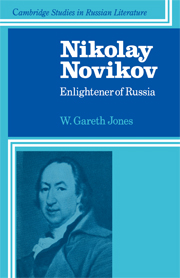Book contents
- Frontmatter
- Contents
- Acknowledgements
- Foreword
- 1 Noble beginnings (1744–69)
- 2 A family of satirical weeklies (1769–73)
- 3 The Drone (1769–70)
- 4 Imperial patronage (1770–3)
- 5 In search of the Russian reader (1773–5)
- 6 Disillusions and doubts (1774)
- 7 The historian (1773–91)
- 8 The freemason (1775–80)
- 9 A move to Moscow (1779–83)
- 10 The Russian reader discovered (1779–82)
- 11 The Typographical Company (1784–91)
- 12 Martyrdom and meditation (1791–1818)
- Afterword
- Notes
- Bibliography
- Index
1 - Noble beginnings (1744–69)
Published online by Cambridge University Press: 05 November 2011
- Frontmatter
- Contents
- Acknowledgements
- Foreword
- 1 Noble beginnings (1744–69)
- 2 A family of satirical weeklies (1769–73)
- 3 The Drone (1769–70)
- 4 Imperial patronage (1770–3)
- 5 In search of the Russian reader (1773–5)
- 6 Disillusions and doubts (1774)
- 7 The historian (1773–91)
- 8 The freemason (1775–80)
- 9 A move to Moscow (1779–83)
- 10 The Russian reader discovered (1779–82)
- 11 The Typographical Company (1784–91)
- 12 Martyrdom and meditation (1791–1818)
- Afterword
- Notes
- Bibliography
- Index
Summary
If you ask me ‘who is he?’ then I … will not tell you. ‘The name is not the man’, Russians used to say in olden days.
KaramzinA family home
The surname of Novikov is a common one in present-day Russia, and most of its bearers would probably assume that it came from novyy, the Russian for ‘new’. But, as so often with popular etymology, they would be wrong in thinking of it as a Russian equivalent of Newman. It is derived from novik, a term used in Muscovy to describe a young nobleman who had recently entered service at court, an apprentice courtier or pageboy, a ‘new man’ of a particular sort. Doubtless one of Nikolay Novikov's forbears had been given the name as a son of a novik, although it is not known when this happened, for the most distant-known ancestor in his family tree, Merkuley Mikhaylovich, already had the family name of Novikov at the beginning of the sixteenth century.
By the name that he bore, therefore, Nikolay Ivanovich Novikov was conscious of himself as a nobleman, born into a class of the Russian nation which accounted for some 1 per cent of the population. Within this sliver of Russia even, Nikolay Novikov had a special position. Even if Russians knew the genealogy of their clan which ensured their noble status, unlike the nobility of Western Europe they rarely had roots in an ancestral home.
- Type
- Chapter
- Information
- Nikolay NovikovEnlightener of Russia, pp. 4 - 23Publisher: Cambridge University PressPrint publication year: 1984



